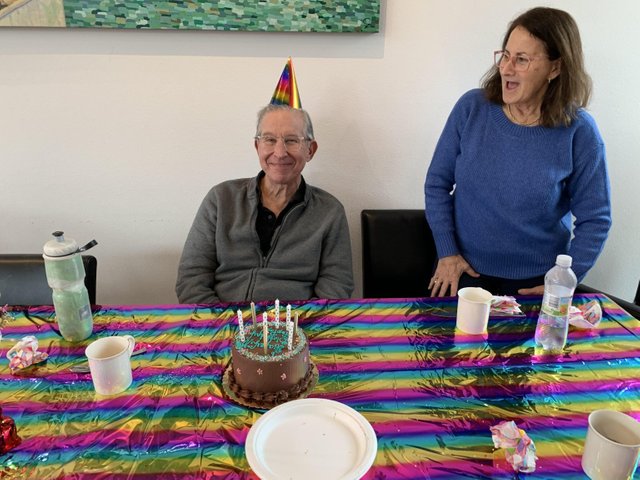Happy 70th birthday Dad!

When, before covid, I used to travel the world giving quantum computing talks, every once in a while I’d meet an older person who asked whether I had any relation to a 1970s science writer by the name of Steve Aaronson. So, yeah, Steve Aaronson is my dad. He majored in English in Penn State, where he was lucky enough to study under the legendary Phil Klass, who wrote under the pen name William Tenn and who basically created the genre of science-fiction comedy, half a century before there were any such things as Futurama. After graduating, my dad became a popular physics and cosmology writer, who interviewed greats like Steven Weinberg and John Archibald Wheeler and Arno Penzias (discoverer of the cosmic microwave background radiation). He published not only in science magazines but in Playboy and Penthouse, which (as he explained to my mom) paid better than the science magazines. When I was growing up, my dad had a Playboy on his office shelf, which I might take down if for example I wanted to show a friend a 2-page article, with an Aaronson byline, about the latest thinking on the preponderance of matter over antimatter in the visible universe.
Eventually, partly motivated by the need to make money to support … well, me, and then my brother, my dad left freelancing to become a corporate science writer at AT&T Bell Labs. There, my dad wrote speeches, delivered on the floor of Congress, about how breaking up AT&T’s monopoly would devastate Bell Labs, a place that stood with ancient Alexandria and Cambridge University among the human species’ most irreplaceable engines of scientific creativity. (Being a good writer, my dad didn’t put it in quite those words.) Eventually, of course, AT&T was broken up, and my dad’s dire warning about Bell Labs turned out to be 100% vindicated … although on the positive side, Americans got much cheaper long distance.
After a decade at Bell Labs, my dad was promoted to be a public relations executive at AT&T itself, where when I was a teenager, he was centrally involved in the launch of the AT&T spinoff Lucent Technologies (motto: “Bell Labs Innovations”), and then later the Lucent spinoff Avaya—developments that AT&T’s original breakup had caused as downstream effects.
In the 1970s, somewhere between his magazine stage and his Bell Labs stage, my dad also worked for Eugene Garfield, the pioneer of bibliometrics for scientific papers and founder of the Institute for Scientific Information, or ISI. (Sergey Brin and Larry Page would later cite Garfield’s work, on the statistics of the scientific-citation graph, as one of the precedents for the PageRank algorithm at the core of Google.)
My dad’s job at ISI was to supply Eugene Garfield with “raw material” for essays, which the latter would then write and publish in ISI’s journal Current Contents under the byline Eugene Garfield. Once, though, my dad supplied some “raw material” for a planned essay about “Style in Scientific Writing”—and, well, I’ll let Garfield tell the rest:
This topic of style in scientific writing was first proposed as something I should undertake myself, with some research and drafting help from Steve. I couldn’t, with a clear conscience, have put my name to the “draft” he submitted. And, though I don’t disagree with much of it, I didn’t want to modify or edit it in order to justify claiming it as my own. So here is Aaronson’s “draft,” as it was submitted for “review.” You can say I got a week’s vacation. After reading what he wrote it required little work to write this introduction.
Interested yet? You can read “Style in Scientific Writing” here. You can, if we’re being honest, tell that this piece was originally intended as “raw material”—but only because of the way it calls forth such a fierce armada of all of history’s awesomest quotations about what makes scientific writing good or bad, like Ben Franklin and William James and the whole gang, which would make it worth the read regardless. I love eating raw dough, I confess, and I love my dad’s essay. (My dad, ironically enough, likes everything he eats to be thoroughly cooked.)
When I read that essay, I hear my dad’s voice from my childhood. “Omit needless words.” There were countless revisions and pieces of advice on every single thing I wrote, but usually, “omit needless words” was the core of it. And as terrible as you all know me to be on that count, imagine how much worse it would’ve been if not for my dad! And I know that as soon as he reads this post, he’ll find needless words to omit.
But hopefully he won’t omit these:
Happy 70th birthday Pops, congrats on beating the cancer, and here’s to many more!
quotation